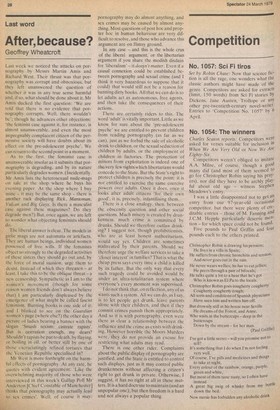Last word
After, because?
Geoffrey Wheatcroft
Last. week we noticed the attacks on pornography by Messrs Martin Amis and Richard West. Their thrust was that pornography was corrupt and obnoxious, but they left unanswered the question of whether it was in any true sense harmful and, if so, what should be done about it. Mr Amis ducked the first question: 'We are told that there is no evidence that pornography corrupts. Well, there wouldn't be'; though he advances other objections: 'the feminist case against it, for instance, is almost unanswerable, and even the most impregnably complacent citizen of the permissive society will have doubts about its effect on the pre-adolescent psyche'. We can return to the second point in a moment.
As to the first. the feminist case is unanswerable insofar as it submits that pornography is degrading, and by its nature particularly degrades women. (Incidentally. Mr Amis lists the heterosexual nude-mags on sale at the shop where he buys his evening paper. At the shop where I buy mine — it may be the same shop — there is another rack displaying Rick, Mantoman, Vulcan and Big Guys. Is there a masculist case against these magazines? Do they degrade men?) But, once again, we are left to wonder what objecting feminists should do.
The liberal answer is clear. The models in girlie mags are not automata or artefacts. They are human beings, individual women possessed of free wills. If the feminists object so strongly to the degraded activities of these sisters they should go out and, by the force of moral suasion, urge them to desist. Instead of which they threaten — at least. I take this to be the oblique threat — a nev,. censorship. Sympathetic as I am to the women's movement (though for some reason women friends don't always believe that) I am particularly displeased by the emergence of what might be called fascist feminism. Burning books is one side of it; and I blinked to see on the Guardian women's page (where else?) the other day a picture of ladies bearing a banner with the slogan 'Smash sexism: castrate rapists'.
But is castration enough, my dears? Shouldn't rapists be put to death, by flaying. or boiling in oil, or better still by one of those excruciatingly refined tortures that the Venetian Republic specialised in?
Mr West is more forthright on the harm ful effects of pornography. At any rate, he quotes with evident agreement: `Like the overwhelming majority of those who were interviewed in this week's Gallup Poll Mr Anderton [Chief Constable of Manchester] thinks that pornography may actually lead to sex crimes'. Well, of course it may: pornography may do almost anything, and sex crimes may be caused by almost anything. Most questions of post hoc and propter hoc in human behaviour are very difficult to resolve, and those who advance this argument are on flimsy ground.
In any case — and this is the whole crux of the liberal argument,' or the libertarian argument if you share the modish disdain for 'liberalism' — it doe.yn't matter. Even if a causal connexion could be established between pornography and sexual crime (and I think it very hazardous to suppose that it could) that would still not be a reason for banning dirty books. All that we can do is to let adults act as autonomous, free agents, and then take the consequences of their actions.
There are certainly riders to this. The word 'adult' is vitally important. Little as we know for sure about the 'pre-adolescent psyche' we are entitled to prevent children from reading pornography (as far as we can). just as we forbid the sale of alcoholic drink to children, or the sexual seduction of children by adults, or the employment of children in factories. The protection of minors from exploitation is indeed one of the;very few rights which libertarians would concede to the State. But the State's right to protect children is precisely the point: it is not entitled to exercise the same coercive powers over adults. Once it does, once it looks after adult citizens 'for their own good'. it is, precisely, infantilising them.
There is a close analogy, then, between the obscenity question and other social questions. Much misery is created by drunkenness, much crime is committed by drunks. Should we therefore outlaw drinking? I suggest not, though prohibitionists, who are at least honest authoritarians, would say yes. Children are sometimes maltreated by their parents. Should we therefore urge the welfare services to take a 'closer interest' in families? That is what the cheap press says every time a child is killed by its father. But the only way that every such tragedy could be avoided would be under an ultra-totalitarian system where everyone's every moment was supervised.
I do not think that, on reflection, any of us wants such a system. All we can do, as I say. is to let people get drunk, leave parents alone with their children, and then if they commit crimes punish them appropriately. And so it is with pornography, even were there as clear a relationship between the influence and the crime as exists with drinking. However horrible the Moors Murders were, they do not provide an excuse for restricting what adults may read.
There is one other rider. Complaints about the public display of pornography are justified, and the State is entitled to control such displays, just as it may control public drunkenness without affecting a citizen's right to get drunk in private. Otherwise, I suggest, it has no right at all in these matters. It is a hard doctrine to maintain (and an unpopular one); but then freedom is a hard and not always a popular thing.


































 Previous page
Previous page